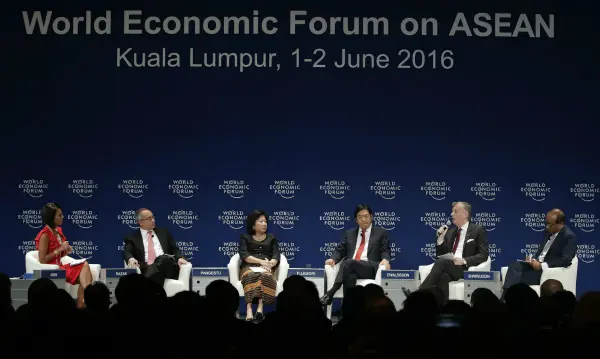Cambodian Prime Minister Hun Sen questioned yesterday the extent of the ASEAN Economic Community’s (AEC) commitment towards forming an inclusive economic region as countries continue to compete with each other for agricultural exports and inflows of foreign direct investment on the 25th World Economic Forum in Kuala Lumpur.
Cambodia Prime Minister Hun Sen speaks at the 25th World Economic Forum in the Malaysian capital of Kuala Lumpur on Jun 1. Photo: The Phnom Penh Post
The World Economic Forum is celebrating its 25th anniversary in Asia this year, as it hosts the regional meet in Kuala Lumpur.
The organisation prides itself on being able to provide a platform for governments, companies and civil societies to discuss issues pertaining to the region and the way forward.
Klaus Schwab, Founder and Executive Chairman of the World Economic Forum, speaking with the then Singapore Prime Minister, Mr Lee Kuan Yew and Mr Tony Tan Keng Yam, the then Deputy Prime Minister of Singapore, at WEF's East Asia Economic Forum in Singapore, in 1994. It was the first time that the Forum was held in Singapore. Nearly 700 businessmen, bankers and academics attended the summit. Photo: World Economic Forum
The Forum, which was earlier known as the East Asia Forum, now focuses on Asean, given its growing importance.
India's former Prime Minister Manmohan Singh speaking with other panellists at the WEF in Singapore in 1995. He was the Chairman of the Parliamentary Committee on Commerce in India, then. This was also the year that WEF marked its 25th global anniversary. Photo: World Economic Forum
Two years later, WEF was in Myanmar, hosting the first major international conference and encouraging its partners to pay attention to the country that had been isolated for over three decades.
United Nations Secretary General Ban Ki-Moon, who was South Korea's Foreign Affairs Minister in 2004 celebrating his birthday on the sidelines of the Asia Strategic Insight Roundtable, organised by the WEF in Seoul, that year. Photo: World Economic Forum
And last year, at the WEF meet in Jakarta, it launched Grow Asia, an initiative to assist small farmers in South-east Asia.
Singapore Prime Minister Lee Hsien-Loong walks with delegates attending the WEF in Singapore, in 2007. Seen with him in the picture are Gloria Macapagal Arroyo, President of the Philippines and Carlos Ghosn,
President and Chief Executive Officer, Renault. Photo: World Economic Forum
Abhisit Vejjajiva, Prime Minister of Thailand, Klaus Schwab, Executive Chairman, World Economic Forum, Thein Sein, Prime Minister of Myanmar, Nguyen Tan Dung, Prime Minister of Vietnam and Hun Sen, Prime Minister of Cambodia, catch a moment together, while waiting for the opening ceremony of the WEF in Ho Chi Minh city, in 2010. Photo: World Economic Forum
Klaus Schwab, Executive Chairman of the World Economic Forum signals the opening of the WEF meeting in Jakarta in 2011, in a traditional gong ceremony. Photo: World Economic Forum
U Khin Aung Myint, Speaker of the House of Representatives, Sai Mauk Kham, Vice President, Aung San Suu Kyi, Chairwoman, National League for Democracy and Shwe Mann, Member of Parliament, Myanmar greet each other before the opening ceremony of the WEF in Myanmar, in 2013. Photo: World Economic Forum
Thein Sein, President of Myanmar hands over the ceremonial Swiss bell to Benigno Aquino, President of the Philippines at the closing ceremony at the WEF meet in Yangon, in 2013. Manila hosted the next WEF meet. Photo: World Economic Forum
During Hun Sen's speech at the first World Economic Forum on East Asia since the AEC came into effect at the end of last year, the prime minister was quick to note the challenges of regional integration.
“We are concerned that the ASEAN Economic Community still has many challenges. If we talk about the one market, it is a big [one], but one should not forget that ASEAN consists of less developed countries and high developed countries,” he said yesterday at the summit held in Malaysia.
He explained that for less developed countries striving to climb up the economic ladder, attracting foreign direct investment (FDI) is essential. “We need to find coordination and partnership, so that we can guarantee that we can all get a piece of the meat,” he said.
Although the Kingdom’s stable GDP growth of 7 per cent a year proved that the economy could weather such storms as a Chinese slowdown, the prime minister argued that competition within the Greater Mekong sub-region for food exports hindered Cambodia’s bottom line.
“ASEAN is competing with itself,” he said. “If Vietnam drops the price [of food exports], Cambodia drops the price, Thailand drops the price and Myanmar drops the price, finally our production gets little profit.”
The prime minister also addressed labour concerns among ASEAN member states, saying that for countries that export labour, especially to Malaysia, “We need to think of a safety network among ASEAN countries.”
Unlike last year’s summit held in Jakarta, the prime minister did not raise concerns about the Trans-Pacific Partnership (TPP), a regulatory trade framework that excludes the Kingdom.
Cambodia, which was the last member to join ASEAN in 1999, has remained a vociferous proponent of inclusive-growth strategies for poverty reduction.
For the first time, Cambodia will host the World Economic Forum next year, a milestone that the Kingdom’s business community said will put Cambodia higher up on investor’s radars.
(THE STRAITS TIMES, THE PHNOM PENH POST)
 简体中文
简体中文



